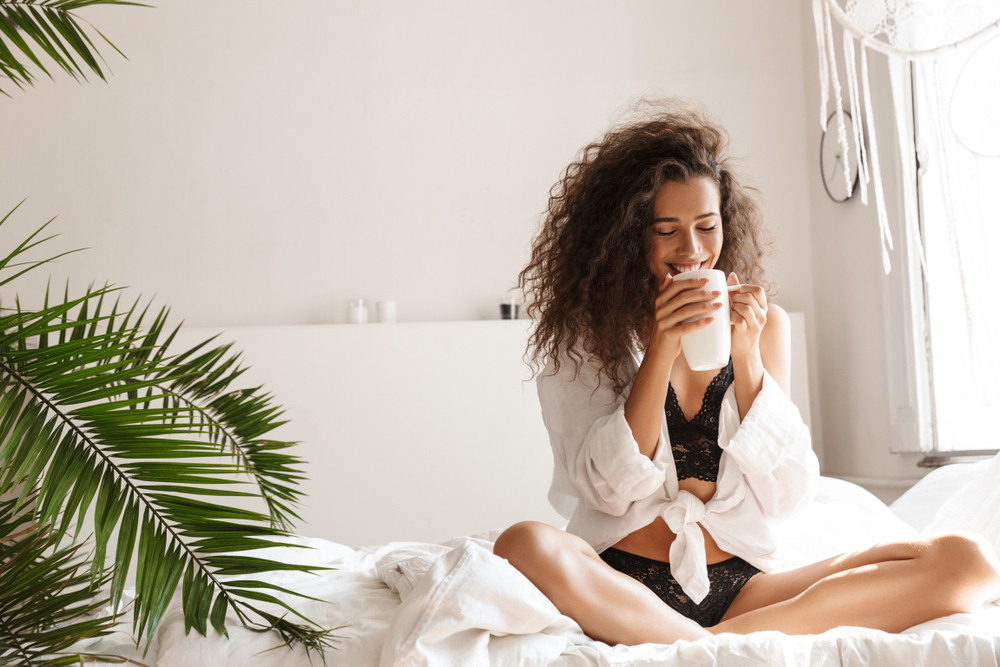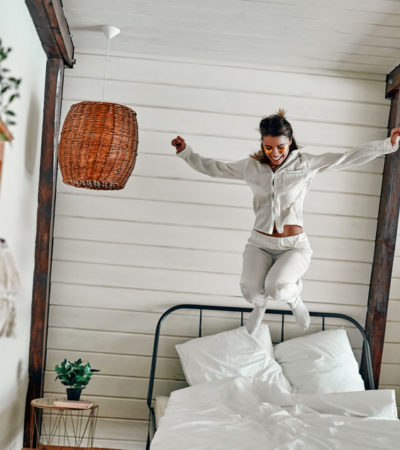Do you know your Ayurvedic Dosha? Discover how balancing out your own dosha type can help you sleep.
What is Ayurveda and how can it help with my sleep? Ayurveda is the traditional system of health that was first developed in India and has been used for centuries to support, nourish and heal the body. Translated as ‘knowledge of life’, Ayurveda offers guidance on living in a truly authentic way, offering a manual for how to get the most out of life, by balancing body, mind, senses and spirit. It offers a beautifully simple approach, without being simplistic.
Ayurveda offers deep insights into the nature of sleep problems and what we can do about it. Vata, Pitta and Kapha are the mind-body types that help us to understand why our body functions in certain ways, but also how we can best help ourselves.
Do we all have the same sleep-related issues? No, not at all. There are different types of insomnia such as ‘type 1’- difficulty falling asleep and ‘type 2’- waking during the night with difficulty falling back to sleep. Sleep can also be affected by common health issues such as anxiety, depression, pain, restless leg syndrome and nocturia (needing to urinate at night). Many effects of a lack of sleep, such as sugar cravings, low mood and inability to focus are well known. Medical journals and studies have often revealed that not getting enough sleep is linked to a range of mental and physical health issues including obesity, heart disease and diabetes – and shortens your life expectancy.
Sleep offers time for the body to repair and recharge itself. If we did not sleep we could not live. Interestingly, between the hours of 10 pm-2 am is where physical repair processes happen. Between 2 am-6 am is where psychological repair processes get going- essentially the brain gets cleaned.
But how much do we need? There is no simple answer to this, as we are all different. So we can bust the sleep myths that you must get 8 hours a night. What a person needs is very individual and may be anything from 4-10 hours. There is also a myth that you need less sleep as you get older. However, most older people need the same sleep as they did when they were younger. They may just take it at different times – like napping – and thus have shorter nights for that reason. There is also a perception that napping is bad for your night’s sleep. Most animals nap throughout the day and night – cat naps- and it is likely to be a biological pattern that we could use if we needed to. The most effective naps may be in the early mid-afternoon when energies commonly dip. A short nap at this time – a siesta or ‘power nap’ – can be very helpful. However napping is not for everyone, as we will see.
It’s clear everyone has different sleep needs. However, there are many reasons why we may not be getting what we need. Ayurveda, the traditional Indian science of wellness, offers a unique insight into why some people are vulnerable to disturbed sleep, whilst others can have an expresso just before bed and still sleep like a baby.
An understanding of your Ayurvedic dosha (or unique mind-body type) can offer a unique understanding of what sort of issues may be affecting your sleep. Knowing your dosha can also provide some simple diet and lifestyle changes that can help. If you don’t know your dosha you can find out here.
Vata types (or those with a Vata imbalance) are generally more alert and wakeful, with this dosha being linked with nervous expression and movement. Though aggravated Vata can cause problems falling asleep, it is much more likely to cause waking and being unable to get back to sleep between 2 and 6 am. Vata types are generally light sleepers, often relying on blackout blinds, earplugs and eye masks and preferring a soft, cosy bed. Vata is also behind issues such as teeth grinding, sleepwalking and sleep talking. This type also dreams a lot, with active, busy dreams.
Pitta types (or those with a pitta imbalance) tend to sleep for a medium duration, somewhere between Vata and Kapha types. Difficulty falling asleep is the classic pitta-type sleep disorder as high pitta can be mentally stimulating, overwhelming any desire to sleep. This type can become ‘night owls’ between 10 pm and 2 am, when pitta dominates. They may also be more restless in the night, preferring fewer covers with their tendency to overheat and have fiery dreams.
Kapha types (or those with a Kapha imbalance) tend to be heavy sleepers, not easily disturbed or awakened. However, they are more likely to have sleep apnoea (breathing difficulties) and wake up needing to urinate at night. They love being in a soft bed, with lots of warm covers, and enjoy calm dreams. This type needs less sleep but has a tendency to get more than is physiologically necessary. This can lead to feelings of heaviness and difficulties in waking up.
When trying to improve sleep, it’s helpful to develop good sleep habits. ‘Sleep hygiene’ works on the idea that many sleep problems are due to bad habits built up over time. The most important tip is to maintain regularity so go to bed and get up at the same time each day. Other suggestions include getting up if you cannot stay asleep and only using your bedroom only for sleep and sex (not as an office or media centre!).
Ayurvedic practitioner, Kate Siraj (ayurvedapractice.com) offers another tip for all for better sleep: “Try massaging the soles of the feet with coconut or sesame oil just before bed. The connection between the feet and sleep isn’t intuitively obvious but it really helps in calming a buzzing mind. You can also massage your head, with or without oil, which is very relaxing. Breathing techniques as you are lying in bed are really helpful, such as inhaling for a count or 3 or 4 and exhaling to a count of 6 or 8.”
Ayurveda also offers some tips tailored to your dosha type.
For high energy Vata types, getting a routine is really important. Sleep by 9.30 pm if you can, the latest by 10 pm. These types are also encouraged to get plenty of rest, or cat-naps, at any time of the day. Practices such as Yoga savasana (final relaxation) and yoga Nidra are also great. Diet-wise, cutting out caffeine can really help- this type may not be able to tolerate a coffee even after breakfast. Vata reducing, grounding teas containing herbs such as liquorice, fennel, cardamom or tulsi taken throughout the day and especially in the evening will allow the mind to calm a lot quicker come bedtime. Eating warm, cooked foods is also best for this dosha. Winding down in the early evening with a warm bath and some gentle yoga stretches is helpful, avoiding anything too stimulating.
Determined and driven Pitta types can get more restful sleep by generally aiming for more moderation and balance, in both work and play. Its key to limit distractions and stimuli in the evening, such as screens, in order to be able to get to sleep around 10 pm. Keeping your bedroom cool with plenty of ventilation is also helpful. A simple evening meal with less spice and limiting coffee and alcohol will also help. Teas containing chamomile, rose, mint or liquorice will cool and soothe pitta throughout the day and are especially useful in the evening.
Relaxed, laid back Kapha types mostly sleep very well, but if not aim for more stimulation, exercise and activity in the day to balance this dosha. It’s also important to avoid heavy, sweet foods in the evening such as wheat, cheese and yoghurt. Like exercise, eating a light dinner such as a bowl of soup encourages more lightness throughout the sleep cycle and will generally improve the quality of sleep as well. It is best to finish dinner at least three hours prior to bedtime. Invigorating teas such as those with ginger, clove, pepper, turmeric or cinnamon will stimulate and revitalise this dosha. This type should never nap in the day, as this is very aggravating for this dosha. It’s also best for them not to have a lie-in but to get up as close to 6 am as they feel able.
words by Jo Webber, Ayurvedic Doctor, Medical Herbalist and Herbal Advisor for Pukka Herbs.














